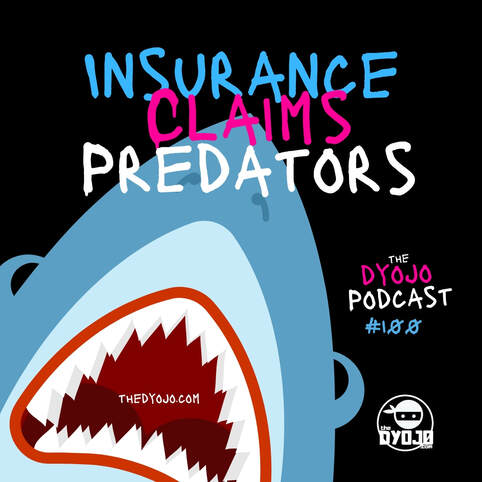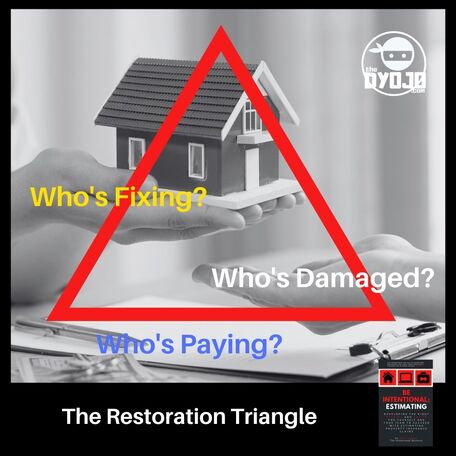|
In the wake of Hurricane Ian, Florida's Chief Financial Officer Jimmy Patronis went on television to warn consumers about unscrupulous contractors and public adjusters. Patronis refered to them as "locusts" and "predators" that complicate the recovery process. He encouraged residents to contact their insurance agent, carrier representative, or his office rather than any other party. He announced that there will be an "insurance village" where the government and the insurance companies are working together to write checks. The date of this speech was September 29, 2022 as part of a presentation with Governor Ron DeSantis. Florida CFO Labels Contractors and Public Adjusters "Locusts" and "Predators"Transcript from the Jimmy Patronis video shared above: Now here's the most important thing I need you to take away from this conversation. The predators that are going to come up, they're gonna initially try to sign up construction management contracts, public adjuster, they're going to come in like a bunch of locusts. And they're trying to hit the neighborhoods. And people are vulnerable right now. They're going to look for a solution. And their solution is always going to be important. But that solution is not going to be knocking on the door every time. If it sounds too good to be true, it is. Please, that first phone call that you're going to make needs to be to your agent, your carrier, or to my office at 1-877-MY-FL-CFO. If one of the first three phone calls you make in your house in order to get an insurance claim settled is one of those three, there's almost zero chance you can be taken advantage of. But, Panama City was my hometown, I lived through Hurricane Michael. We did. We did 12 Insurance villages there over a year sponsored. We're going to be here bringing the carrier's back. And they will write checks on site. Okay. But when you start complicating the claim, because you've allowed predators to get involved with your claim, you're going to drag it out. So the best solution is between you, your carrier, and us. The more people you bring into it, the harder it's going to be to get a settlement that's going to be fair for everybody. And look at the end of the day. If your carrier doesn't want to work with you. That's when you call my office and we'll take them to task." Predatory Practices During Insurance ClaimsIn a state whose insurance system is so much in disrepair and has come under so much scrutiny, not just in the last couple of years, but for quite some time now. There's no mention of the insurance company's participation, or the state's mismanagement, or the government's inability to effectively help shift things back into the right order. There is no accountability for Patronis, the government, or the insurance companies. Even the policyholders have some responsibility when consumers seize upon the opportunity to use an event to their Betterment rather than just to their repair. Patronis says, "The predators that going to come in like a bunch of locusts" while "people are vulnerable." No one would dispute that there are bad actors in all sectors. What left many people questioning his choice of words was the stutus of the insurance claims industry and process in his state. There are predatory practices in the insurance claims industry, Mr. Patronis places a lopsided amount of the blame on two parties in particular, contractors and public adjusters. Are door-to-door sales predatory? Are we to understand that if a consumer who has someone knocking on the door offering to provide a service that they need the logic of the CFO of the state of Florida says that they are likely a predator? If this is the case, what is his solution? Patronis instructs consumers to call their agent, their insurance company, or his office (the government).
Patronis says that if your first call is to one of the three members of the good team, "There's almost zero chance you can be taken advantage of." I think history has shown, especially in the state of Florida, that no one cares more for the consumer than the government and the insurance companies, right? The Jimmy Patronis Claims RemedyIf a policyholder who has severe damages to their home in the state of Florida follows Patronis' advice, how does the reader think this scenario will play out?
The policyholder calls their local insurance agent. Hmmm, does the reader forsee any issue there? A local insurance agent who lives in the same hurricane ravaged area as the policyholder. If they aren't dealing with their home and office being destroyed, what is the likelihood that their office phone is overwhelmed with similar calls? What is the chance that the consumer gets through to their local insurance agent, it's probably very low. So, what should they do, just keep calling and wait patiently until they can get through?
The policyholder calls their insurance company's claims line. After a catastrophic event, it's likely that they will get through quickly and that the carrier will have a representative out in a timely manner as well, right? The reader knows that hurricane recovery is a process and it takes time. But, does that mean the home or business owner should keep calling and wait patiently until they can get through?
The policyholder calls the office of Jimmy Patronis. After a catastrophic event, it's likely that they will get through quickly and that the carrier will have a representative out in a timely manner as well, right? The reader knows that hurricane recovery is a process and it takes time. But, does that mean the home or business owner should keep calling and wait patiently until they can get through?
Mr. Patronis says his office will model prior hurricanes and create an insurance village where carriers will be writing checks onsite. If the reader watches the video clip from The DYOJO Podcast or reads the transcript, Jimmy advises, "If it sounds too good to be true, it probably is." But of course, his statement wouldn’t apply to the government or the insurance companies (the good guys) only to the bad guys. If consumers don't wait for the government and the insurance companies to get their insurance village set up and then meet them there, Patronis says they are at fault? Protecting Consumers By Reducing Their RightsMost people listening to the Patronis speech get caught up in the "locust" comment. But there are so many items he brings up that are far more concerning. Jimmy wants policyholders to make the calls, wait for the answers, and then join him in the insurance village for their check. He warns consumers, "When you start complicating the claim, because you've allowed predators to get involved with your claim, you're going to drag it out." In summary, Jimmy says that policyholders complicate their claims and drag them out by allowing predators into the process. Jimmy says that policyholders complicate their claims and drag them out by allowing predators into the process. As we have said many times, The Restoration Triangle should be respected. The policyholder, the contractor, and the insurance carrier each have roles and responsibilities during the claims process. If the consumer does not believe that the claims process is going the way it should, that the policy is not being enforced the way it was sold to them, or the way it is stipulated in their insurance policy, then claims advocates, public adjusters, and lawyers are options well within their rights. When Patronis encourages consumers not to understand nor exercise their rights is the government playing its role in protecting the consumer? If there was a contractor or a public adjuster or a lawyer that was advising policyholders to ignore their insurance company, that could be a legitimate orange flag. The consumer, their contractor of record, and the carrier each has a role to play. The carrier should not overstep in the relationship between the contractor and the consumer. Nor should the contractor overstep in the relationship between the carrier and the policyholder. The claims questions should include:
Accountability For All Claims PredatorsPatronis says his office is going to "Be here, bringing the carriers back, and they will write checks onsite." His message is, "Come trust the government and the insurance companies. Don't exercise your rights to consult with a contractor, public adjuster, or a lawyer." What is the reason that a policyholder should not exercise their rights? According to the CFO of Florida, it will complicate the process of reaching an outcome that is “fair for everybody”. Bad actors should be called to account. Yet, the disbursement of consequences is as lopsided as the disbursement of funds from those holding the policy monies. As we have discussed before, if a policyholder is negligent or misrepresents the truth on their claim (i.e. fraud), they can be criminally prosecuted. If an insurance company delays, denies, or defends a claim, to the detriment of the policyholder, they are often civilly prosecuted at most. The consumer may go to jail while the carrier may only pay a fine. As David Princeton, author of the C&R Magazine segment “Dear David”, mentions in the closing segment of this video clip from The DYOJO Podcast, "Is there something that needs to be done? Certainly. But I also think something needs to be done on the carrier side because at least on the public side there's scrutiny to look at that and on the carrier side there's no scrutiny." This video and this article are not dismissing the reality of predatory practices by contractors, public adjusters, and lawyers, but calling for equal scrutiny of the people claiming to be the solution. The DYOJO Podcast Episode 100 will feature Bill Wilson, author of When Words Collide: Resolving Insurance Coverage and Claims Disputes, as well as David Princeton, Advocate Claim Service.
0 Comments
Leave a Reply. |
Words
The DYOJO - helping contractors shorten Archives
June 2024
Categories
All
EstimatingMarketingInsurance ClaimsLeadership |
|
| |||||||



 RSS Feed
RSS Feed
